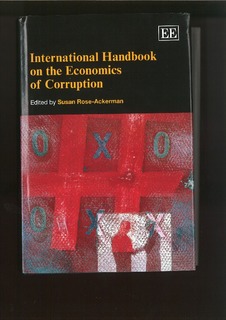| dc.contributor.author | Fjeldstad, Odd-Helge | |
| dc.date.accessioned | 2018-01-04T08:19:07Z | |
| dc.date.available | 2018-01-04T08:19:07Z | |
| dc.date.issued | 2006-01-01 | |
| dc.identifier | oai:www.cmi.no:2090 | |
| dc.identifier.citation | in Susan Rose-Ackerman, ed.: International Handbook on the Economics of Corruption. Cheltenham: Edward Elgar pp. 484-511 | |
| dc.identifier.isbn | 139781845422424 | |
| dc.identifier.uri | http://hdl.handle.net/11250/2474956 | |
| dc.description.abstract | Over the past two decades many developing countries have implemented comprehensive reforms of their tax administrations in order to increase revenue and curb corruption. This chapter examines recent experiences in the fight against corruption in the Uganda Revenue Authority (URA). It argues that the technocratic remedies supported by donors have underplayed the degree to which progress in tax administration depends upon a thorough "cultural change" in the public service. The motives of individual actors are often inextricably tied to the interests of the social groups to which they belong. In the URA, patronage runs through networks grounded on ties of kinship and community origin. As such, people recognize the benefits of large extended families and strong kinship ties, even as their social and economic aspirations may be indisputably modern. This implies that such social relations may undermine formal bureaucratic structures and positions. If these problems, which are rooted in social norms and patterns of behavior rather than in administrative features, are overlooked, the result may be to distort incentives. As a consequence, the government's commitment to reforming the tax administration may also be undermined. | |
| dc.language.iso | eng | |
| dc.publisher | Edward Elgar | |
| dc.relation | International Handbook on the Economics of Corruption | |
| dc.relation.ispartof | International Handbook on the Economics of Corruption | |
| dc.relation.ispartofseries | International Handbook on the Economics of Corruption | |
| dc.relation.uri | https://www.cmi.no/publications/2090-corruption-in-tax-administration | |
| dc.subject | Corruption | |
| dc.subject | Incentives | |
| dc.subject | Social Norms | |
| dc.subject | Tax Administration | |
| dc.subject | Tax Evasion | |
| dc.subject | Uganda | |
| dc.subject | East Africa | |
| dc.title | Corruption in Tax Administration: Lessons from Institutional Reforms in Uganda | |
| dc.type | Chapter | |
